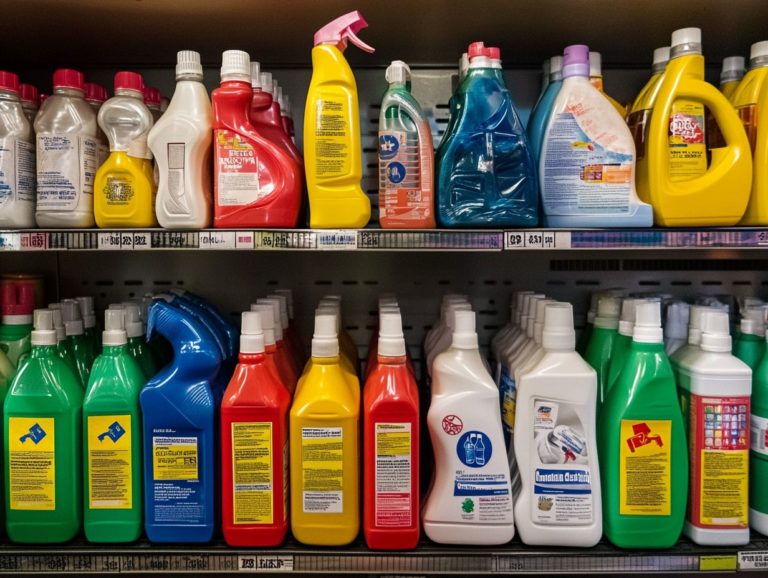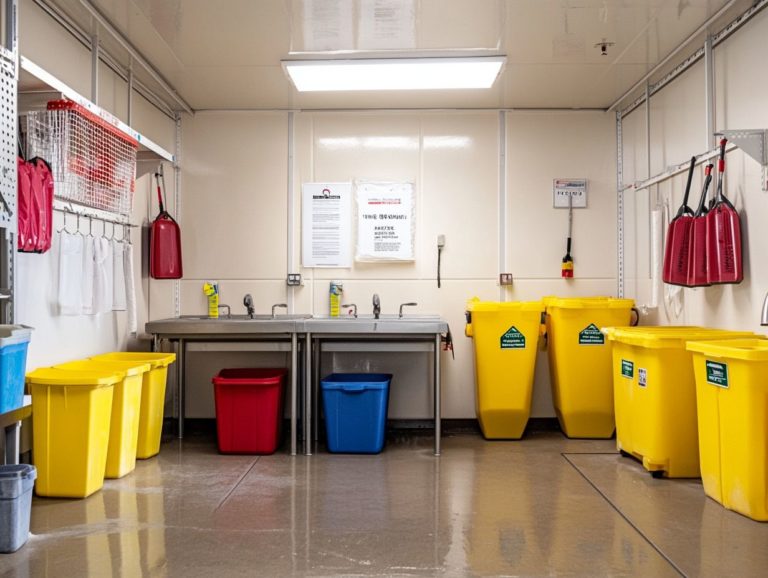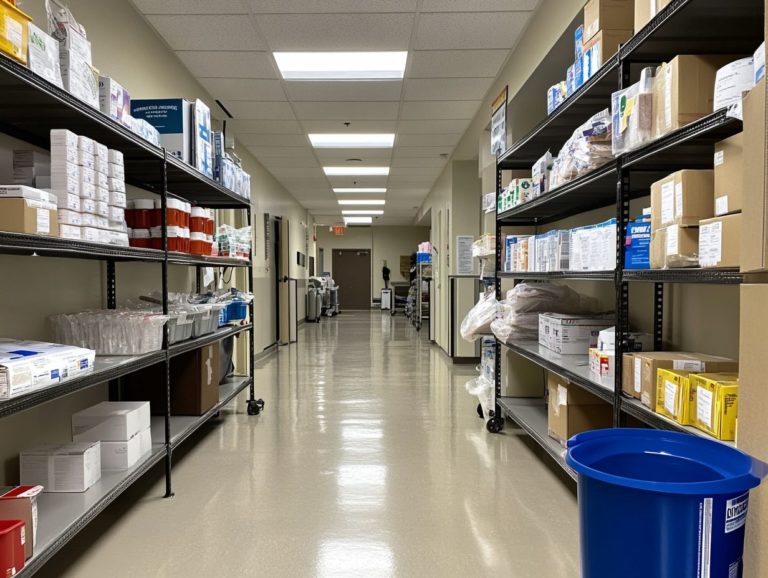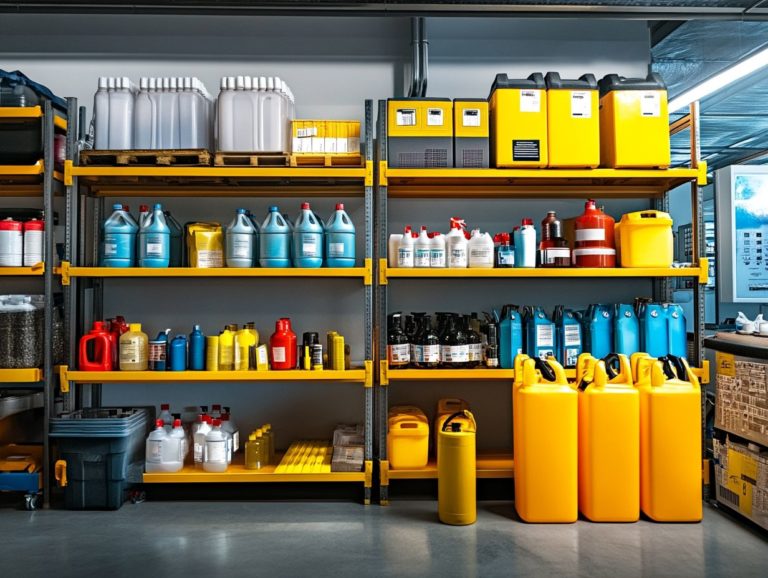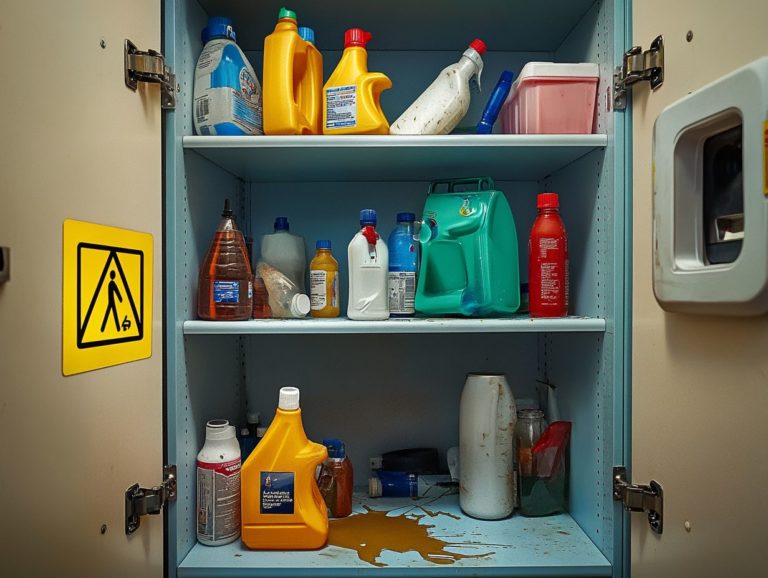How to Store Your Cleaning Supplies Safely
Storing cleaning supplies safely is essential for safeguarding your family and pets from possible dangers. Proper product storage and organizing cleaning tools can prevent numerous accidents.
When you don t store these cleaning products properly, you open the door to accidents, including poisoning or dangerous chemical reactions. That s why it s crucial to understand the risks involved, especially those related to cleaning products that can harm health and incompatible cleaning chemicals.
This guide brings to light the dangers of neglecting proper storage methods and provides practical tips to keep your cleaning supplies organized and secure.
Whether you’re looking for best practices for specific products or safe disposal methods, you ll find everything you need to create a safer home environment. Implementing proper cleaning techniques and following expert safety tips can transform your home organization and improve air quality.
Contents
- Key Takeaways:
- Why Is It Important to Store Cleaning Supplies Safely?
- What Are the Dangers of Improper Storage of Cleaning Supplies?
- How to Properly Store Cleaning Supplies?
- What Are the Best Practices for Storing Specific Cleaning Supplies?
- What Should You Do If You Accidentally Mix Cleaning Supplies?
- How to Dispose of Old or Unused Cleaning Supplies Safely?
- Frequently Asked Questions
- What are the best ways to store your cleaning supplies safely?
- Why is it important to store cleaning supplies safely?
- Should cleaning supplies be stored in the same area as food or medicine?
- How can I safely store cleaning supplies with young children in the house?
- Can I mix different cleaning supplies for more effective results?
- How often should I check and dispose of expired or unused cleaning supplies?
Key Takeaways:
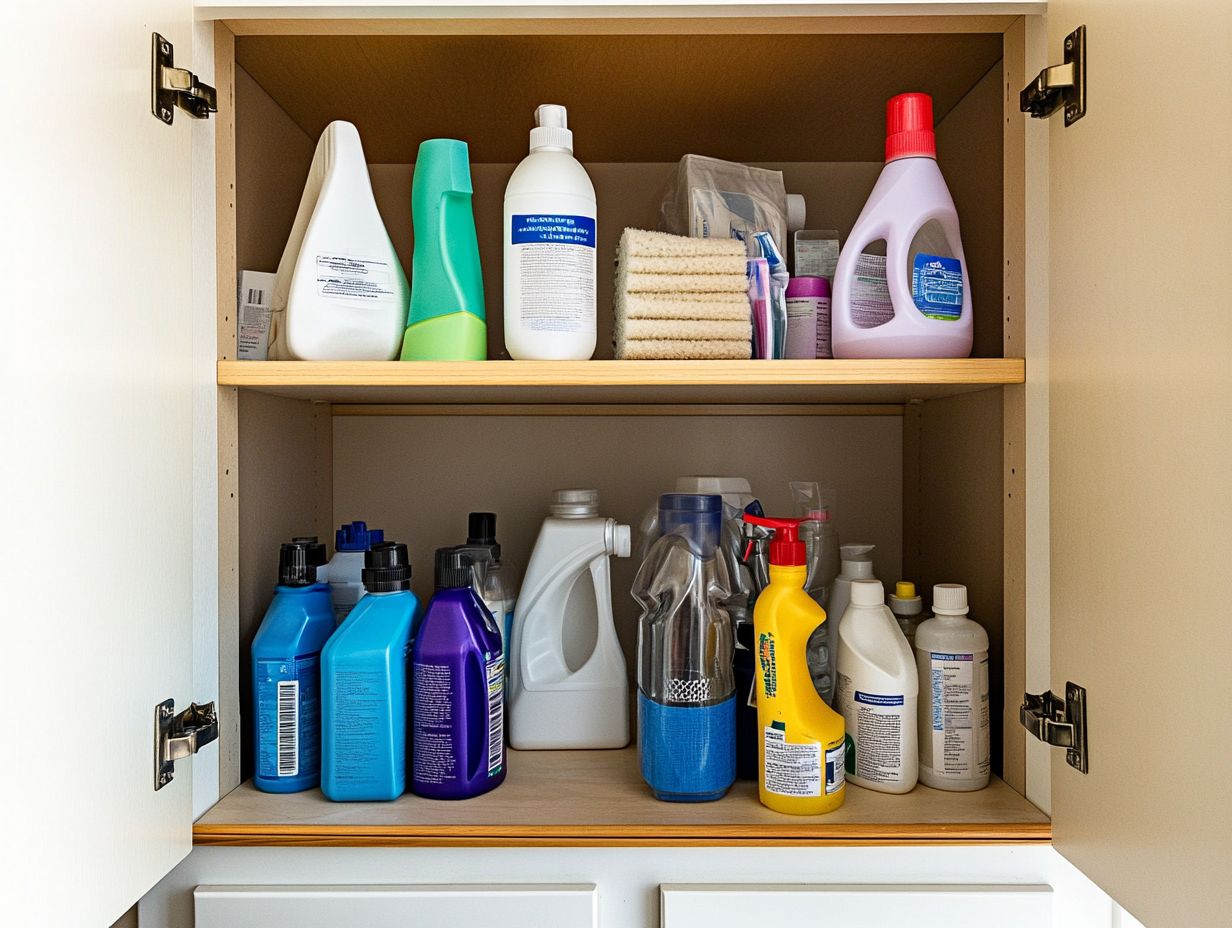
- Keep cleaning supplies out of reach of children and pets to prevent accidental ingestion or exposure.
- Store cleaning supplies in a cool, dry place like a designated space or utility room to avoid potential reactions or degradation of the product, especially in high humidity environments.
- Properly label and date cleaning supplies to ensure they are used within their recommended shelf life and to avoid confusion. Rotating supplies regularly is also recommended.
Why Is It Important to Store Cleaning Supplies Safely?
Safely storing your cleaning supplies is essential for maintaining a secure home environment. Improper storage can lead to hazardous reactions, particularly when dealing with harmful cleaning chemicals. Your top priority should be the safety of children and pets, ensuring that potentially toxic cleaners and products are well out of their reach. Organizing experts like Marie Kondo emphasize the importance of decluttering and safe storage practices.
Using secure storage methods helps prevent accidents and enhances the air quality in your home by reducing exposure to harmful substances. By thoughtfully organizing your space, you can designate specific areas for these cleaning supplies, allowing for easy access whenever you need them. Consider using a professional organizer for optimizing home design and storage methods.
What Are the Dangers of Improper Storage of Cleaning Supplies?
Improper storage of cleaning supplies poses significant dangers, including the risk of toxic cleaners leaking or reacting with other chemicals, which can trigger hazardous reactions. This situation not only jeopardizes the safety of everyone in your household but can also create environmental hazards that impact air quality and overall home safety. You can avoid accidents by learning from common cleaning mistakes and following best practices.
When cleaning products are unsecured, curious children or pets could inadvertently access them, leading to accidental poisoning or serious injuries. Therefore, understanding how to store your cleaning supplies safely is vital for keeping your family safe!
Storing cleaning agents in unsuitable environments, like damp areas or those exposed to direct sunlight, can compromise the integrity of the products and heighten the risk of spills or degradation over time. Additionally, mislabeling or failing to return products to their original containers can amplify the danger, fostering confusion and increasing the chances of mixing incompatible substances. Consulting cleaning experts can provide additional cleaning tips and techniques to avoid such pitfalls.
Understanding these risks is crucial for every household. Even a minor oversight in managing cleaning supplies can lead to serious injuries or long-term health issues for you and your loved ones. Engaging cleaning personnel or services like Greenway Carpet Cleaning Las Vegas can ensure that cleaning tasks are handled professionally and safely.
How to Properly Store Cleaning Supplies?
Properly storing your cleaning supplies is crucial for maintaining an organized and safe environment. You can use simple techniques that prioritize both safety and accessibility.
Begin by designating a specific area for your cleaning supplies perhaps a utility closet or under the sink where everything can be neatly organized. Clear bins are your best friends here, as they allow for quick identification of cleaning products. You might also consider consulting with a professional organizer to optimize your storage capabilities.
To make the most of your vertical space, install wall-mounted shelves. Use a portable cleaning caddy to streamline your daily cleaning routine, providing easy access to your go-to cleaning tools. Using a cleaning caddy is one of the top cleaning tips for maintaining an organized space.
1. Keep Cleaning Supplies Out of Reach of Children and Pets
To ensure the safety of your children, keep all cleaning supplies well out of reach. Many cleaning products can be toxic and harmful if ingested, so proper storage is key. Secure these items in locked cabinets or place them on high shelves that are inaccessible to little ones. Install child-proof locks on cabinets where hazardous cleaners are stored to significantly reduce the risk of accidental exposure or poisoning.
Using clear labeling on all cleaning supplies enables caregivers to quickly identify which products are safe for household use. It’s also beneficial to educate older children about the dangers of these substances to cultivate a culture of safety and awareness in your home.
Don’t overlook your furry friends; use safety latches on drawers where cleaning items are stored to prevent pets from accessing hazardous materials. Always have emergency contact information for poison control readily available, reinforcing the importance of prevention and preparedness in maintaining a safe environment for both children and pets. Resources from experts like Martha Stewart and Health magazines provide valuable insights on maintaining pet safety in homes.
2. Store Cleaning Supplies in a Cool, Dry Place
Storing your cleaning supplies in a cool, dry place is essential for keeping your cleaning supplies effective and preventing any unwanted degradation or adverse reactions, particularly in high humidity settings. Excess moisture can encourage the growth of mold or mildew on your cleaning products, diminishing their effectiveness and potentially compromising air quality in your home.
Be mindful of areas like basements or bathrooms, as they tend to be more susceptible to dampness, making them unsuitable for your cleaning supplies. When these products are exposed to elevated temperatures, their chemical compositions can break down, weakening their cleaning power or even rendering them completely ineffective. This can ultimately lead to inadequate sanitization, jeopardizing the hygiene of your living space.
By ensuring that your cleaning supplies are stored correctly, you help maintain proper air quality, which can reduce potential allergens and pollutants in your environment, contributing to a healthier home atmosphere. Following advice from experts like Alexandra Kelly and Marilee Nelson at Branch Basics can guide you in maintaining a safer environment.
3. Use Proper Containers for Storage
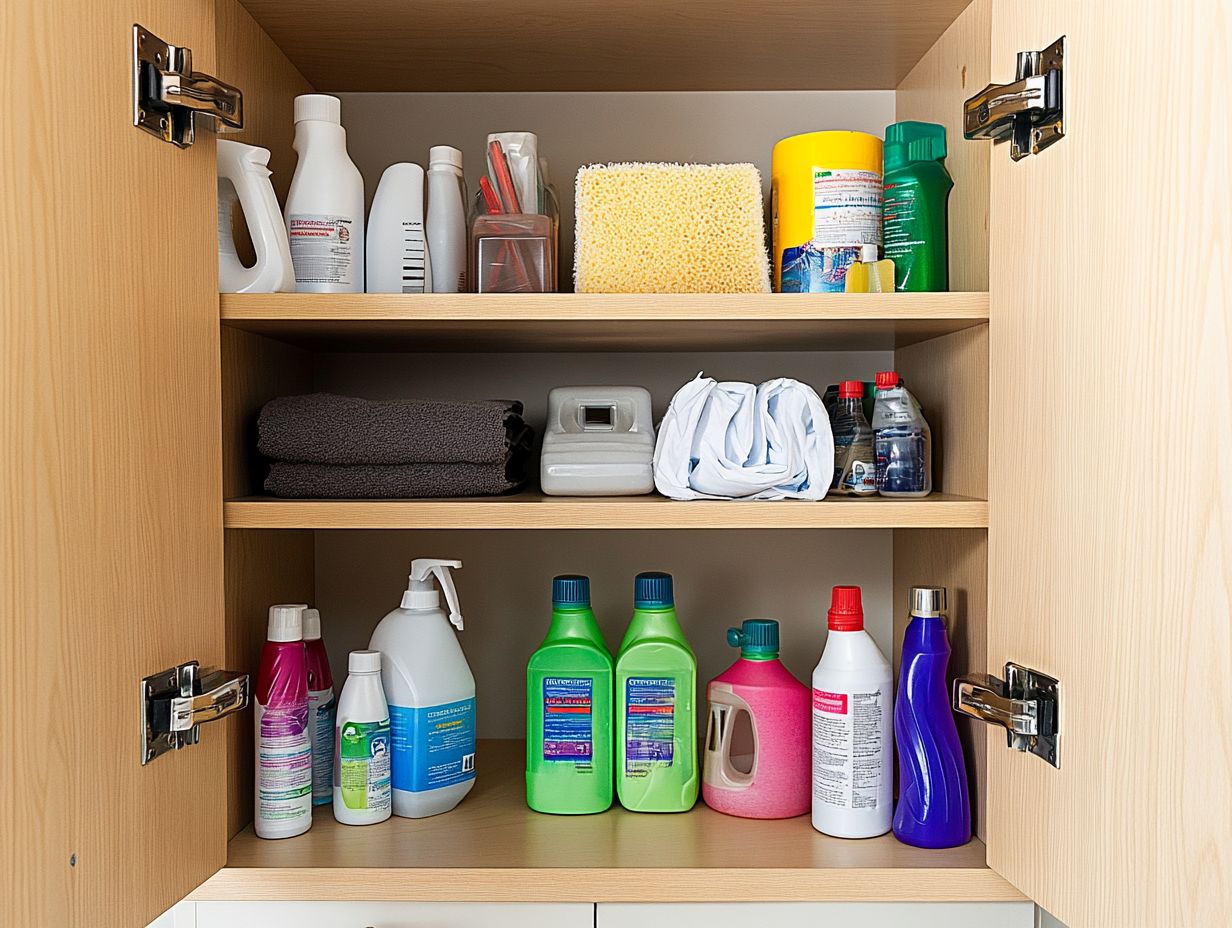
Using proper containers for your cleaning supplies enhances your organization and minimizes the risk of spills or leaks. Opt for clear bins that allow for easy identification of products at a glance. Choose sturdy containers specifically designed to hold your cleaning tools and solutions securely. This prevents accidental mixing of incompatible chemicals.
Labeling these containers with clear expiration dates and contents empowers you to manage your cleaning inventory effectively while maintaining a clutter-free storage area. Proper labeling is essential for safety.
This approach streamlines your cleaning process and boosts safety by reducing the chances of misusing a product or overlooking an expired item. Clear bins are particularly advantageous in busy households or workplaces, as they provide immediate visibility of the contents. This enables you to quickly grab what you need without digging through a chaotic mess.
Consulting a professional organizer like Mary Cornetta of Huza Home Concepts can provide additional organizing tips and strategies.
By embracing proper storage solutions like labeled containers and categorized bins, you create an efficient, user-friendly cleaning environment that promotes regular maintenance and nurtures a more organized lifestyle.
4. Keep Cleaning Supplies Away from Food and Cooking Areas
To ensure food safety, keep all cleaning supplies far away from food and cooking areas. Cleaning chemicals can get into food and make it unsafe to eat. Designate specific storage spaces, like a dedicated utility room or closet, for these items. This prevents accidental mixing and maintains a clean and safe food preparation environment.
Establishing a clear boundary is essential don t wait to protect your food from cleaning chemicals!
Improperly stored cleaning agents can easily find their way onto surfaces where food is prepared or served. This increases the risk of chemical contamination. Such oversights can expose you and others to harmful substances, especially vulnerable groups like children and the elderly.
Keep your kitchen safe and clean by storing cleaning supplies away from food!
Implementing smart organizational strategies, such as labeling and creating distinct zones for different uses, can significantly reduce the likelihood of dangerous mixing. Following guidance from cleaning experts like Nashia Baker and Jason Donnelly can further enhance your storage methods and safety.
5. Label and Date Cleaning Supplies
Labeling and dating your cleaning supplies is an essential practice for effective organization and safety. It helps you easily track the contents and shelf life of your various cleaning products. When you mark the containers with clear labels, you eliminate confusion and prevent the mixing of incompatible cleaning solutions, which could lead to dangerous reactions.
Regularly updating these labels enhances your organization and ensures that your cleaning kits are stocked with effective and safe products. This systematic approach minimizes the risk of using expired items that may not perform optimally, ultimately enhancing your cleaning routine.
By taking the time to label each product with its name, intended use, and expiration date, you create an environment where everyone can easily identify the available cleaning supplies and understand how to use them.
This practice simplifies the cleaning process and ensures compliance with safety regulations, further protecting your household from potential hazards. A well-organized cleaning storage system saves you time by reducing the need to search through cluttered cabinets, allowing for a more efficient and enjoyable cleaning experience.
What Are the Best Practices for Storing Specific Cleaning Supplies?
Understanding the best practices for storing your cleaning supplies is crucial for preserving their effectiveness and ensuring safe handling. Each type of cleaning product be it bleach, ammonia, or disinfectants has its own specific storage requirements that help prevent hazards and enhance performance.
By familiarizing yourself with these storage methods, you not only protect the integrity of your cleaning solutions but also contribute to a safer and more harmonious home environment.
1. Bleach
Bleach is an incredibly powerful cleaning agent that requires careful storage due to its potential for hazardous reactions, especially when mixed with other cleaners. Always keep bleach in its original container, tightly sealed, and stored away from high temperatures or direct sunlight, as these factors can degrade its effectiveness.
Designate a specific area for bleach that is clearly marked and separate from other household products to prevent accidental mixing with incompatible chemicals.
Maintain good ventilation in the storage area. Avoid places that are frequently exposed to moisture that can cause degradation. Keep bleach out of reach of children and pets to avoid serious health issues.
Always adhere to the safety guidelines on the label. Use gloves and masks while handling this cleaning supply to minimize exposure to its toxic fumes. Being proactive about safety and storage can significantly reduce risks and help create a secure environment for everyone.
2. Ammonia
Ammonia is a highly effective cleaning agent that demands your attention when it comes to safe storage. Always keep ammonia in a cool, well-ventilated space, away from heat sources and direct sunlight. Never store ammonia near bleach or any chlorine-containing products! This dangerous combination can produce toxic fumes that pose serious health risks.
Always keep ammonia in its original, clearly labeled container, ensuring it is tightly sealed to prevent leaks or accidental spills. If you re handling ammonia, don t forget to wear appropriate safety gear, such as gloves and goggles, to protect yourself from skin or eye irritation.
Check your storage area often for leaks or any signs of chemical deterioration. By following these prudent storage practices, you can significantly reduce the risks associated with this powerful cleaning agent and maintain a safe environment.
Proper management of your cleaning supplies is not just essential; it s a hallmark of responsible housekeeping.
3. Disinfectants
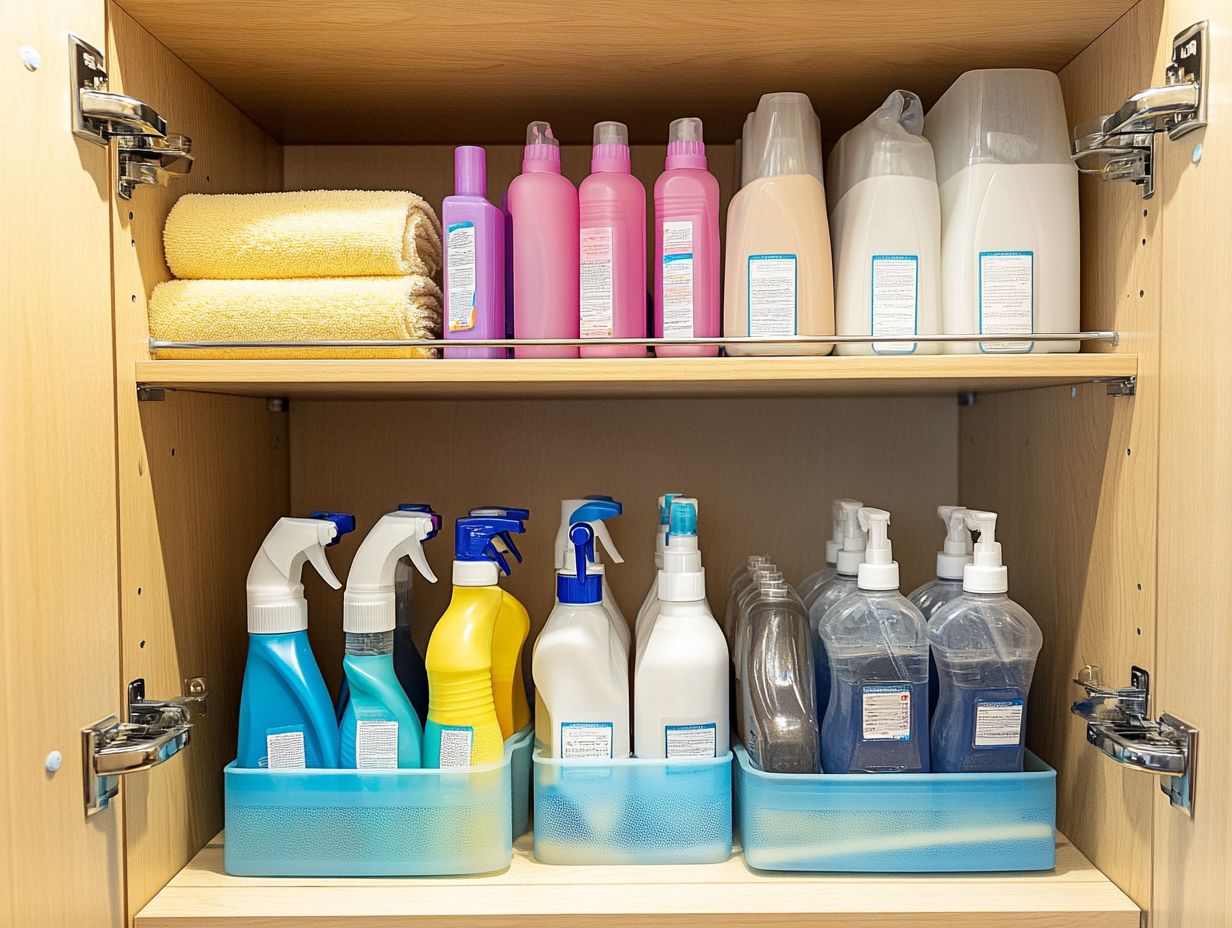
Disinfectants are essential for maintaining a clean and sanitary environment, and proper storage is key to preserving their effectiveness. To maximize their potency, store these cleaning products in a cool, dry place, ensuring they are sealed tightly to prevent evaporation and contamination.
Regularly check expiration dates and replace any expired disinfectants to maintain optimal cleaning performance. Keeping these products out of direct sunlight is crucial, as exposure can degrade their active ingredients and diminish their efficacy.
Avoid placing disinfectants in areas with temperature fluctuations, such as near windows or heaters, where they may be compromised. Organizing your supplies in clearly labeled containers will help you quickly identify and safely handle them.
Always ensure that disinfectants are stored out of reach of children and pets to prevent any accidental exposure. Start organizing your cleaning supplies today for a safer home!
4. Aerosol Sprays
Aerosol sprays are widely used cleaning products that come with specific storage considerations to prevent accidents and ensure your safety. You should store these products upright in a cool, dry place, well away from heat sources and direct sunlight. High temperatures can lead to increased pressure, creating potential explosion hazards. Always take a moment to check the labels for any specific storage instructions provided by the manufacturer to guarantee safe handling.
It’s also important to keep aerosol cleaning supplies out of the reach of children and pets to prevent any unintentional misuse. Storing them in a locked cabinet adds an extra layer of safety that you ll appreciate.
Don t forget to check the expiry dates on your products! Using expired aerosols can be ineffective or even unsafe. When it comes time to dispose of empty or unused cans, make sure to follow your local regulations to minimize environmental impact and prevent hazardous waste buildup.
By adhering to these guidelines, you can confidently enjoy the convenience of aerosol sprays in your cleaning routine while keeping safety at the forefront.
5. Dishwashing Detergent
Dishwashing detergent, while generally considered less hazardous than other cleaning agents, still deserves your attention when it comes to proper storage for both effectiveness and safety. It s best stored in a cool, dry place far from heat sources and out of the curious hands of children to prevent any accidental ingestion.
Keeping the detergent in its original container is a smart move. Regularly checking for any leaks or damage ensures that it remains in top condition.
It s also important to avoid keeping the detergent near food items or in areas where food is prepared. This simple step significantly reduces the risk of contamination. Remember, the effectiveness of your detergent can diminish if exposed to humidity or direct sunlight, so choosing a spot in a kitchen cabinet or pantry is ideal.
If you re storing different types of cleaning supplies together, make sure the lids are tightly secured to avoid any accidental spills. Adhering to the product’s labeling guidelines is also crucial; it helps maintain both potency and safety, which is essential for achieving those optimal cleaning results you desire.
What Should You Do If You Accidentally Mix Cleaning Supplies?
If you accidentally mix cleaning supplies, act fast! Your first course of action should be to evacuate the area and ventilate it by opening windows and doors.
Steer clear of any fumes, and if you notice a strong reaction like smoke or overpowering odors don t hesitate to call emergency services for help in managing the situation safely.
While you await assistance, make sure everyone maintains a safe distance from the affected area to minimize risks associated with inhaling toxic substances. It s also wise to identify the cleaning supplies involved in the mix-up, as certain combinations can release harmful gases, such as chlorine gas from bleach and ammonia.
If any spills have occurred, resist the urge to clean them up until professionals arrive, as you could inadvertently worsen the reaction.
Properly labeling your cleaning supplies can significantly reduce the chances of such hazardous accidents in the future. Keep in mind that proactive communication with those around you about the potential dangers of mixing different chemicals is crucial and should never be underestimated.
How to Dispose of Old or Unused Cleaning Supplies Safely?
Disposing of old or unused cleaning supplies safely is crucial to prevent environmental contamination and potential hazards. Many cleaning products contain dangerous chemicals that require special disposal methods.
Avoid pouring cleaning products down the drain or tossing them in the trash. This can pose significant risks to the environment and public health.
Seek out designated hazardous waste disposal sites or community collection events where you can safely bring these substances for proper disposal. Be sure to read the labels carefully they often have helpful disposal tips!
Some cleaning supplies may even be recyclable or reusable, so taking the time to research and follow local recycling programs can greatly contribute to sustainability efforts. By adhering to best practices and regulations, you can play a vital role in ensuring the safe and responsible management of hazardous materials and prevent a hazardous reaction.
Frequently Asked Questions
What are the best ways to store your cleaning supplies safely?
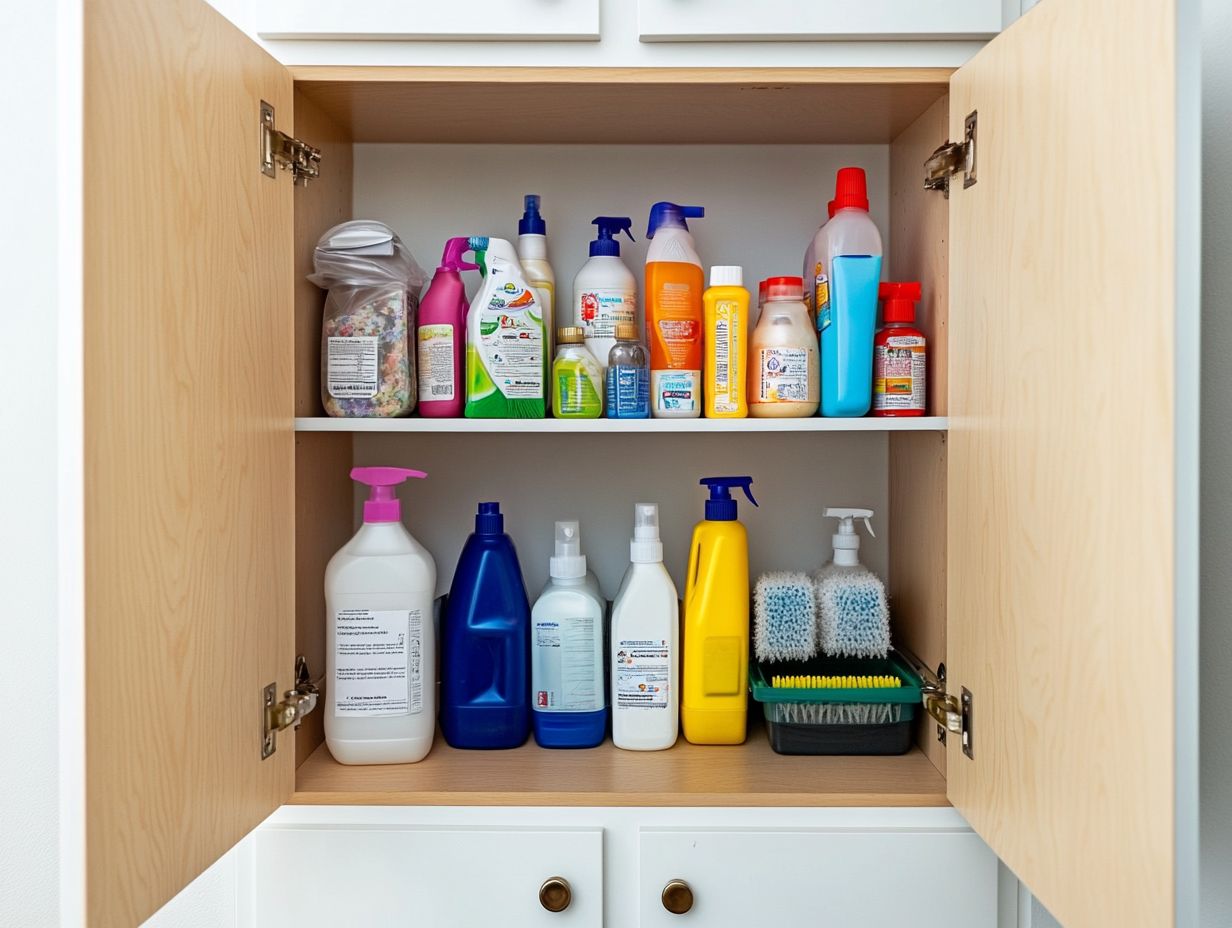
The best ways to store your cleaning supplies safely include:
- Keeping them in a cool, dry place away from direct sunlight, like under the sink.
- Storing them in their original containers with labels intact.
- Keeping them out of reach of children and pets.
Consider using clear bins for easy access and to improve home organization.
Why is it important to store cleaning supplies safely?
Storing cleaning supplies safely is important to prevent accidents or injuries, as well as to maintain the effectiveness of the products. Improper storage can lead to spills, leaks, or exposure to toxic chemicals.
Should cleaning supplies be stored in the same area as food or medicine?
No, cleaning supplies should be stored separately from food or medicine. Chemicals from cleaning supplies can contaminate these items and make them unsafe for consumption or use.
Utilize vertical space with wall-mounted shelves to increase storage capabilities and ensure designated space for each item.
How can I safely store cleaning supplies with young children in the house?
You can store cleaning supplies in a locked cabinet or on a high shelf that is out of reach of children. It is also important to educate children about the dangers of cleaning supplies and to always supervise them when using them.
Employ child safety measures and consider organizing tips from reputable sources.
Can I mix different cleaning supplies for more effective results?
No, it is not safe to mix different cleaning supplies as they may react with each other and create toxic fumes or other harmful substances. Always follow the instructions on the product label and never mix cleaning supplies unless specifically directed to do so.
How often should I check and dispose of expired or unused cleaning supplies?
You should check your cleaning supplies regularly and dispose of any expired or unused products at least once a year. Expired products may not be as effective and can also be a safety hazard.
Contact your local waste management for proper disposal methods. For better product storage, consider using a cleaning caddy or organizing cleaning kits in a utility closet.
Take your first step towards a safer home today!

